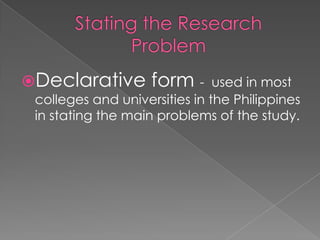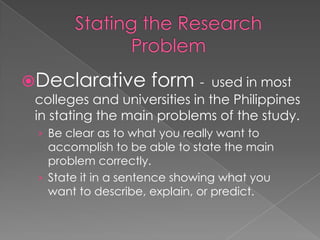Focusing on the research problem
- 3. interests and observations - they can point to directions for research and in sustaining the study - be observant and curious
- 4. Apressing problem needing a solution › Whether in school, workstation, or community
- 5. Other investigator’s theories and research › Research raises more questions than it answers. These questions can serve as starting points for further research
- 6. Literature in one’s field of specialization such as books and journals. They suggest topics for further study and exploration.
- 7. Completed theses and dissertations They normally suggest topics that future researchers can work on (recommendation)
- 8. Suggestions from colleagues and professors, *particularly those who have undertaken research in a particular discipline
- 10. Novel - one which has not been investigated before.
- 11. Novel - one which has not been investigated before. Relevant - once completed, its findings, conclusions, and recommendations can be used in improving practices or solving identified difficulties.
- 12. Novel - one which has not been investigated before. Relevant - once completed, its findings, conclusions, and recommendations can be used in improving practices or solving identified difficulties. Interesting - consider your interest. it counts a lot in the conduct of the study.
- 13. Feasible - can be completed without undue amount of time, money or effort
- 14. Feasible - can be completed without undue amount of time, money or effort Researchable - data can be collected to answer the problem that you posed.
- 15. Feasible - can be completed without undue amount of time, money or effort Researchable - data can be collected to answer the problem that you posed. Ethical - does not involve physical or psychological harm or damage to human beings or organizations.
- 21. Declarative form - used in most colleges and universities in the Philippines in stating the main problems of the study.
- 22. Declarative form - used in most colleges and universities in the Philippines in stating the main problems of the study. › Be clear as to what you really want to accomplish to be able to state the main problem correctly. › State it in a sentence showing what you want to describe, explain, or predict.
- 23. › Answer the following questions: Is the problem statement clear? Does it provide adequate focus and direction for research? Does it identify the key factors or variables of the study?
- 24. Question form - used in stating sub-problems or specific problems of the proposed research.
- 25. Question form - used in stating sub-problems or specific problems of the proposed research. › Every problem can be broken down into smaller or discrete units. These are referred to as “sub-problems”
- 26. Question form - used in stating sub-problems or specific problems of the proposed research. › Every problem can be broken down into smaller or discrete units. These are referred to as “sub-problems” › According to Leedy (2003), it is by viewing the main problem through the sub-problem that the researcher gets a better view of the entire research endeavor.
- 27. Each sub-problem should be a completely researchable unit.
- 28. Each sub-problem should be a completely researchable unit. Interpretation of data must be apparent with each sub-problem.
- 29. Each sub-problem should be a completely researchable unit. Interpretation of data must be apparent with each sub-problem. The sub-problems must add up to the totality of the problems.
- 30. Does the problem require immediate solution? Is it widespread? Does it affect a number of people? If yes, in what way? Who shall benefit from the study of the problem?
- 31. What benefits can be derived from the study on the problem? Who else are interested in studying the problem? What contribution to human knowledge can it bring about?
- 32. As a label for the problem, it shows what the study is all about
- 33. As a label for the problem, it shows what the study is all about It serves as a frame of reference for the entire study
- 34. As a label for the problem, it shows what the study is all about It serves as a frame of reference for the entire study It enables the researcher to claim ownership of the study
- 35. As a label for the problem, it shows what the study is all about It serves as a frame of reference for the entire study It enables the researcher to claim ownership of the study It can help other researchers refer to the work for possible theories related to their proposed studies.
- 36. Should be clear and specific, showing the contents of the study
- 37. Should be clear and specific, showing the contents of the study Shows the relationships among the characteristics or factors being studied, it implies whether the research will focus on differences, effects, or associations between and among variables to be investigated.
- 38. Brief but concise. It is composed of not more than 15 substantive words, excluding function words such as articles, conjunctions, and prepositions.






































